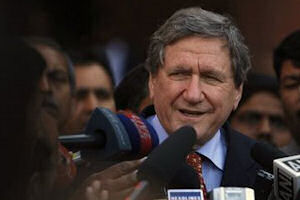 Richard C. Holbrooke, a senior US diplomat who brokered a peace agreement in the former Yugoslavia and lately served as US envoy to Afghanistan and Pakistan, died in Washington on Monday at the age of 69. On Friday he suffered a torn aorta and was hospitalized. In a statement, President Obama said he was "deeply saddened by the passing of Richard Holbrooke, a true giant of American foreign policy who has made America stronger, safer, and more respected. He was a truly unique figure who will be remembered for his tireless diplomacy, love of country, and pursuit of peace."
Richard C. Holbrooke, a senior US diplomat who brokered a peace agreement in the former Yugoslavia and lately served as US envoy to Afghanistan and Pakistan, died in Washington on Monday at the age of 69. On Friday he suffered a torn aorta and was hospitalized. In a statement, President Obama said he was "deeply saddened by the passing of Richard Holbrooke, a true giant of American foreign policy who has made America stronger, safer, and more respected. He was a truly unique figure who will be remembered for his tireless diplomacy, love of country, and pursuit of peace."
Holbrooke served as diplomat under every Democratic president since John F. Kennedy, and spent his time out of government as an investment banker. President Clinton named Holbrooke as ambassador to Germany in 1993. Holbrooke prominently hung a photo of his grandfather in a German World War I uniform at the ambassador's residence, and would point out to German visitors that this proud German patriot also happened to have been a Jew.
Holbrooke rose to fame after President Bill Clinton made him an assistant secretary of state for Europe in 1994, and assigned him the task of resolving the Bosnian war. He worked tirelessly and would brook no refusals; by the beginning of 1996 he had forged a peace deal, the Dayton Accords, that seemed at first shaky, but which has endured. A number of Jewish groups honored Holbrooke for his breakthrough.
Holbrooke's parents were assimilated Jews whose families had immigrated to the United States from Europe, his mother from Germany, his father born to Russian parents in Warsaw. He became more interested in his Jewish roots when his third wife Kati Marton, raised as a Catholic, discovered that her own parents were Hungarian Jews who had hidden their identity.
In an obituary for the German weekly newspaper 'Jüdische Allgemeine', World Jewish Congress Deputy Secretary General Maram Stern called Holbrooke "a titanic figure" of American diplomacy. Stern wrote: "When I met Holbrooke during his tenure as US ambassador in Germany, he proudly told me that his ancestors were German Jews from Hamburg. Later, gave us the full backing of the US government in our negotiations for the restitution of Nazi-looted property, the dormant Swiss bank accounts and for compensation for slave laborers. He also accepted my proposal to appoint Stuart Eizenstat as US special envoy for these matters."







